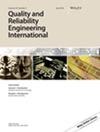在观测数据缺失的情况下评估二阶模型的正交复合设计
IF 2.8
3区 工程技术
Q3 ENGINEERING, INDUSTRIAL
引用次数: 0
摘要
正交阵列复合设计(OACD)和正交均匀复合设计(OUCD)是将两级全因子或分数因子设计与三级正交阵列/均匀设计相结合的正交复合设计,用于估计二阶响应面模型中的线性效应、双线效应和二次效应。本研究评估了在不同的 α 值(附加设计点中非零坐标与中心的距离)条件下,5 ≤ k ≤ 9 个因子的 OACDs 和 OUCDs 的参数估计精度、预测方差和设计效率在不同设计部分(阶乘(f)、轴向(a)和中心(c))中缺失一个观测值的影响。结果表明,缺失一个因子点和一个轴向点对 OACD 和 OUCD 的参数估计精度有不利影响,而缺失一个中心点则影响不大。缺失轴心点对预测方差和设计效率的影响最大。FDS 图显示,当 k≤7 时,OACD 是更好的设计,而当 k = 8 和 9 时,OUCD 是更好的设计。本文章由计算机程序翻译,如有差异,请以英文原文为准。
Evaluation of orthogonal composite designs for second‐order model in presence of missing observation
Orthogonal‐array composite designs (OACDs) and orthogonal‐uniform composite designs (OUCDs) are orthogonal composite designs that combine two‐level full or fractional factorial and three‐level orthogonal‐array/uniform designs for estimation of the linear, bilinear, and quadratic effects in a second‐order response surface model. In this study, the effects of missing one observation in the various design portions (factorial (f ) axial (a ) and center (c )), on the precision of parameter estimates, prediction variance and design efficiency of OACDs and OUCDs for 5 ≤ k ≤ 9 factors at different values of α (the distance of a non‐zero co‐ordinate in an additional design point from the center) are evaluated. The results showed that missing a factorial and an axial point have adverse effect on the precision of parameter estimates of OACDs and OUCDs, while missing a center point has little effect. Missing an axial point caused the highest effect on the prediction variance and design efficiencies. The FDS plots showed OACDs to be better designs for k ≤ 7 and OUCDs for k = 8 and 9 factors.
求助全文
通过发布文献求助,成功后即可免费获取论文全文。
去求助
来源期刊
CiteScore
4.90
自引率
21.70%
发文量
181
审稿时长
6 months
期刊介绍:
Quality and Reliability Engineering International is a journal devoted to practical engineering aspects of quality and reliability. A refereed technical journal published eight times per year, it covers the development and practical application of existing theoretical methods, research and industrial practices. Articles in the journal will be concerned with case studies, tutorial-type reviews and also with applications of new or well-known theory to the solution of actual quality and reliability problems in engineering.
Papers describing the use of mathematical and statistical tools to solve real life industrial problems are encouraged, provided that the emphasis is placed on practical applications and demonstrated case studies.
The scope of the journal is intended to include components, physics of failure, equipment and systems from the fields of electronic, electrical, mechanical and systems engineering. The areas of communications, aerospace, automotive, railways, shipboard equipment, control engineering and consumer products are all covered by the journal.
Quality and reliability of hardware as well as software are covered. Papers on software engineering and its impact on product quality and reliability are encouraged. The journal will also cover the management of quality and reliability in the engineering industry.
Special issues on a variety of key topics are published every year and contribute to the enhancement of Quality and Reliability Engineering International as a major reference in its field.

 求助内容:
求助内容: 应助结果提醒方式:
应助结果提醒方式:


